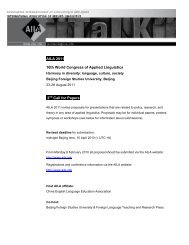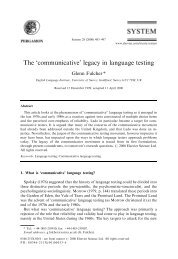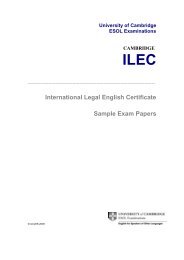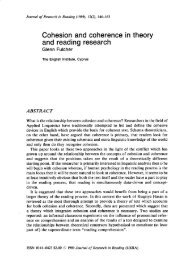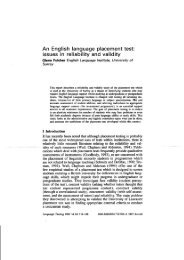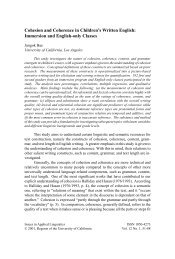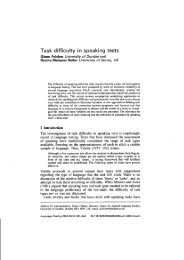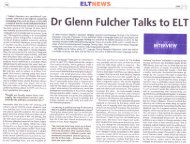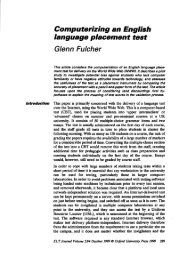Liaison Magazine - LLAS Centre for Languages, Linguistics and ...
Liaison Magazine - LLAS Centre for Languages, Linguistics and ...
Liaison Magazine - LLAS Centre for Languages, Linguistics and ...
You also want an ePaper? Increase the reach of your titles
YUMPU automatically turns print PDFs into web optimized ePapers that Google loves.
A multilingual Europe – ideal or reality<br />
Multilingualism is a key concept in European policy, but Karen M. Lauridsen<br />
questions how close we are to the target of mother tongue plus two <strong>for</strong>eign<br />
languages <strong>for</strong> all Europeans.<br />
viewpoint<br />
Since the end of the 1980s,<br />
more than one million students<br />
have taken advantage of the<br />
ERASMUS <strong>and</strong> other European Union<br />
mobility programmes, <strong>and</strong> have spent<br />
a semester or more at a university in<br />
another European country.They have<br />
thus immersed themselves in <strong>for</strong>eign<br />
cultures <strong>and</strong>, more often than not, in<br />
countries whose languages are<br />
different from the students’ own first<br />
language. From the very beginning, <strong>and</strong><br />
integrated into the student mobility<br />
programmes, has been the idea that<br />
students would learn the language of<br />
their host country as part of the<br />
experience.<br />
Now, twenty years later, the reality is<br />
clearly different from what was<br />
originally intended.While many<br />
students have studied <strong>and</strong> learned the<br />
language of their host country, at least<br />
to a certain level of competence,<br />
others have preferred to go to<br />
English-speaking countries in Europe<br />
<strong>and</strong> beyond, or to universities that<br />
have offered courses taught in English<br />
rather than in the official language of<br />
the university (<strong>and</strong> host country).This<br />
is not least the case in the small<br />
European countries whose languages<br />
are less taught abroad.<br />
The dominance of English<br />
This situation should be seen within<br />
the general socio-economic<br />
developments in Europe <strong>and</strong> what has<br />
become known as the globalisation<br />
process.Technological advances that,<br />
among other things, have facilitated<br />
communication, trade <strong>and</strong> travel<br />
across the world, have contributed to<br />
the fact that English is today the<br />
dominant language of international<br />
business, trade, travel, research <strong>and</strong> –<br />
to a very large extent also –<br />
education.<br />
Why have so many universities<br />
changed their language of instruction<br />
to English, at least <strong>for</strong> some of their<br />
programmes <strong>and</strong> modules First of all,<br />
the researchers are members of<br />
scholarly communities that<br />
communicate with each other <strong>and</strong><br />
publish in English. European<br />
universities compete with each other,<br />
<strong>and</strong> one of the benchmarks of a highquality<br />
university is international<br />
publication in peer reviewed journals<br />
via internationally recognised<br />
publishing houses – in English.The EU<br />
student mobility programmes <strong>and</strong> the<br />
Bologna process have enhanced<br />
student exchanges. And in order to<br />
attract national students, universities<br />
must be able to offer them exchange<br />
places abroad.That, in turn, is only<br />
possible if the same universities can<br />
attract a sufficient number of<br />
exchange students from top<br />
universities in other countries. And if<br />
courses are then all taught in the less<br />
widely taught languages, such as<br />
Danish, most <strong>for</strong>eign students will go<br />
elsewhere.There<strong>for</strong>e, universities in<br />
<strong>Liaison</strong> magazine • llas.ac.uk •25



